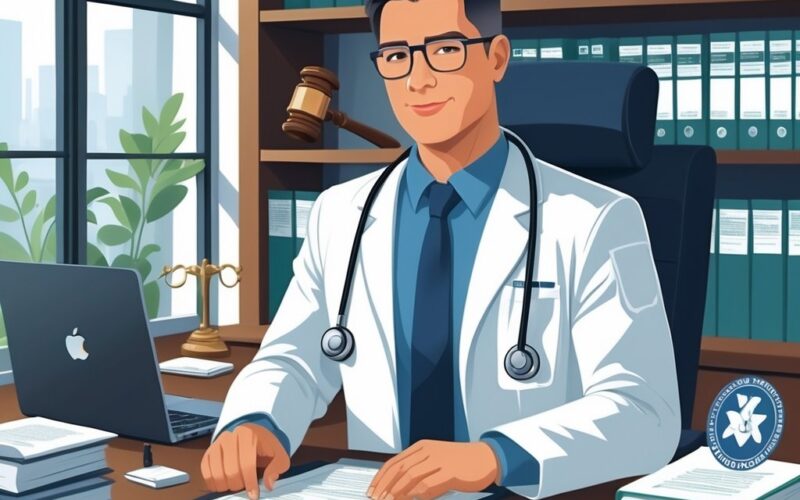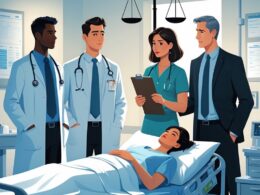A medical legal officer works where medicine and law cross paths. These professionals help solve legal cases that need medical insight. They might examine evidence, write reports, or explain medical facts in court.
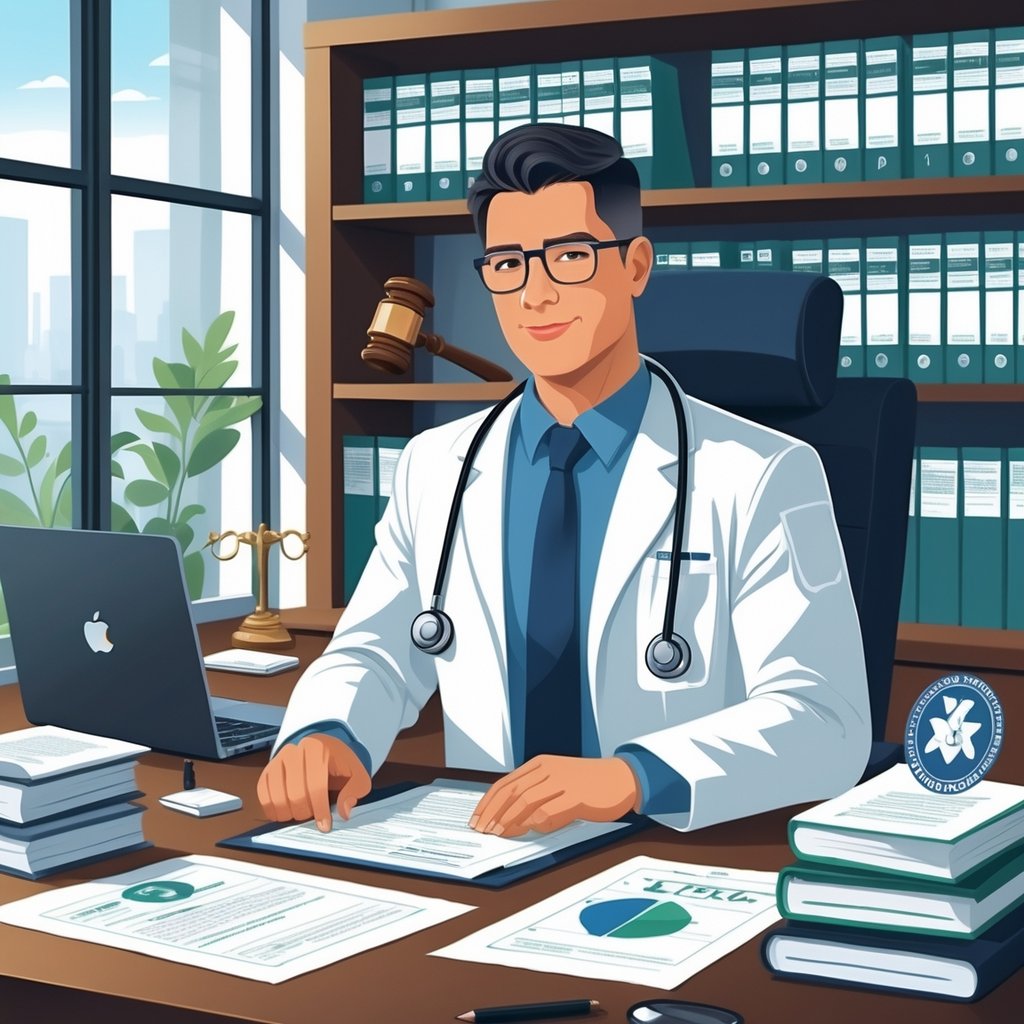
Medical legal officers are doctors or medical professionals who use their expertise to assist in legal matters, from personal injury cases to criminal investigations. They bridge the gap between healthcare and the justice system.
Their work helps lawyers, judges, and juries make sense of complex medical information. The role has grown more important as legal cases involving medical issues keep rising.
Medical legal advisors apply their medical expertise and legal knowledge to guide healthcare regulations and malpractice claims. If you’re considering this career path or just curious about how medicine and law overlap, understanding what these professionals do can be eye-opening.
Key Takeaways
- Medical legal officers are healthcare professionals who apply medical knowledge to assist in legal cases and court proceedings
- Their main duties include conducting examinations, writing expert reports, and providing testimony in various types of legal matters
- This career path offers opportunities for doctors to diversify their practice while contributing to the justice system
Definition and Core Responsibilities of a Medical Legal Officer
A Medical Legal Officer bridges medicine and law using clinical expertise in legal matters. These professionals handle everything from autopsy examinations to expert testimony.
They maintain strict documentation standards for court proceedings. You’ll find them handling a range of cases, often juggling several at once.
Understanding the Role in Healthcare and Legal Contexts
A Medical Legal Officer is a medical professional who provides expertise in legal cases. You work at the intersection of healthcare and law enforcement.
Your medical knowledge becomes crucial when legal cases need clinical interpretation. Daily tasks include examining injuries, documenting findings, and writing detailed reports.
You must recognize and properly record injuries that may have legal significance. This includes cuts, burns, broken bones, and other trauma.
Key responsibilities include:
- Conducting medical examinations for legal purposes
- Writing medico-legal reports for court cases
- Providing expert witness testimony
- Documenting evidence according to legal standards
You also handle cases involving unnatural deaths. This means working closely with police and judicial authorities.
Your medical expertise helps determine causes of injury or death in suspicious circumstances.
Distinction Between Medical Legal Officer and Medico-Legal Expert
Medical Legal Officers work full-time within hospitals or government agencies. You have regular duties examining patients and writing reports.
Your role is operational and hands-on. Medico-legal experts usually work as consultants.
They review cases from outside the healthcare system. These doctors often keep private practices while taking legal cases part-time.
Medical Legal Officer focus:
- Daily hospital or clinic duties
- Government employment
- Regular case load
- Direct patient examination
Medico-Legal Expert focus:
- Consultation work
- Private practice combination
- Case-by-case basis
- Document review emphasis
You need in-depth knowledge of your medical specialty and the ability to translate complex medical terminology into simple explanations. Your reports must be clear enough for judges and juries to follow.
Importance in the Justice and Healthcare Systems
Your work directly impacts legal outcomes. Courts depend on your medical opinions to make fair decisions.
Medico-legal services are the essential link between medicine and the law. Your expertise shapes the results of both criminal and civil cases.
You protect both patients and doctors by keeping proper documentation. Your reports help healthcare providers avoid malpractice issues.
They also ensure patients get fair treatment under the law. Your role requires strict ethical standards.
You must stay neutral and base conclusions only on medical evidence. This objectivity keeps the integrity of both healthcare and legal systems.
Essential Duties and Functions
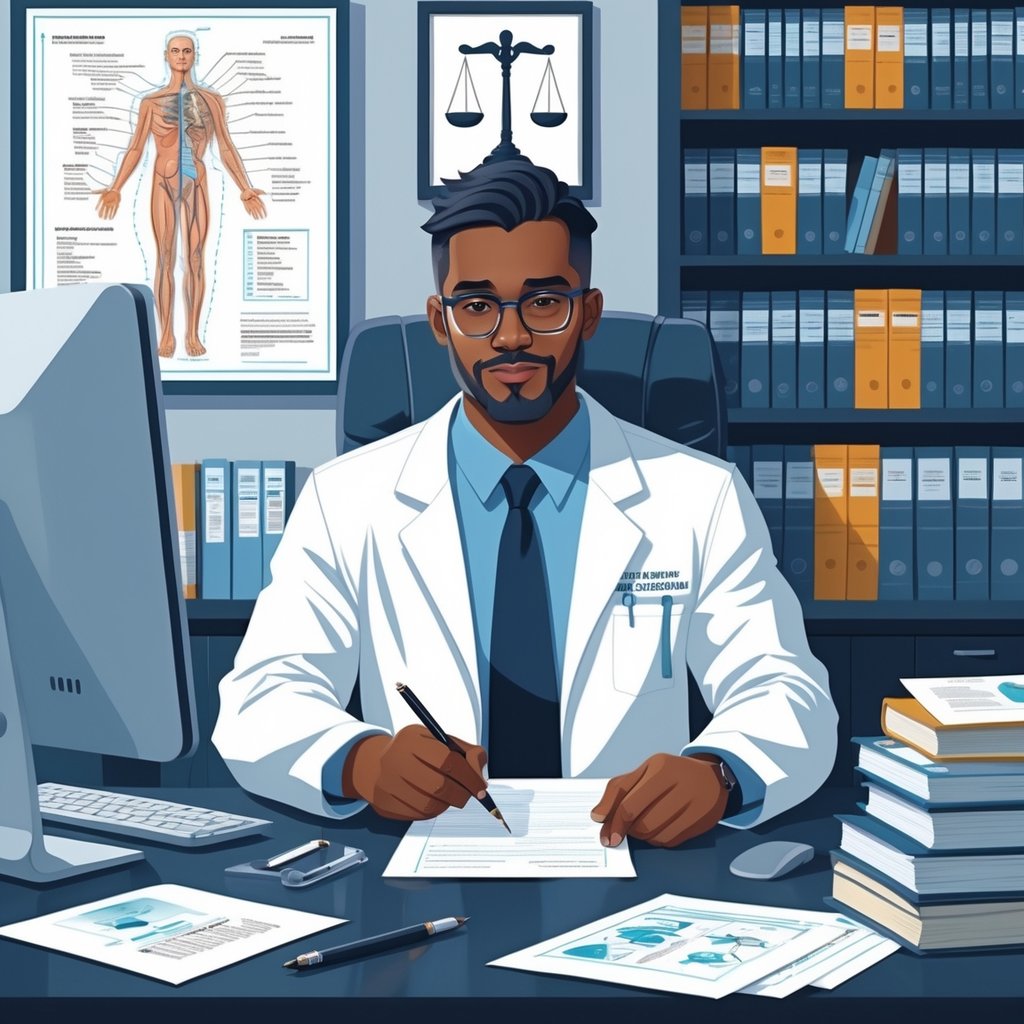
Medical legal officers handle critical cases where medicine meets law. They document injuries, examine trauma patients, and work closely with police and courts.
Documenting and Reporting Medico-Legal Cases
You must carefully record all details when handling medico-legal cases. This includes taking photos, writing detailed reports, and preserving evidence.
Your documentation needs to be exact and complete. Courts rely on your reports to make important decisions.
You need to report certain cases to authorities right away. These include:
- Unnatural deaths
- Suspected homicides
- Sexual assault cases
- Child abuse incidents
- Poisoning cases
Your reports must follow specific legal formats. Medical officers have basic medico-legal duties that include proper recording and reporting of injuries.
You should keep all records for the required time periods. Some cases may need your testimony years later.
Handling Cases Involving Trauma and Injury
You examine patients who have suffered trauma from accidents, violence, or other incidents. Your job is to figure out what caused the injuries.
You need to identify different types of wounds. Each type tells a story about what happened.
- Abrasions show scraping or dragging
- Lacerations mean cutting or tearing
- Contusions reveal blunt force impact
- Burns suggest heat or chemical exposure
You must distinguish between accidental and intentional injuries. This helps police understand if a crime occurred.
Your examination includes measuring wounds, noting their location, and describing their appearance. You also collect samples for lab testing if needed.
You work with trauma patients who may be scared or in pain. Your approach needs to be gentle but thorough.
Interfacing with Law Enforcement and Legal Authorities
You serve as a bridge between the medical world and legal system. Police officers depend on your medical knowledge to move cases forward.
You explain medical findings in simple terms so lawyers and judges can follow. Complex medical terms need to be broken down.
You may testify in court about your examinations and findings. Your testimony can determine the outcome of criminal cases or civil lawsuits involving medical malpractice.
You coordinate with different agencies including police departments, district attorneys, and coroners. Each group needs specific information from your reports.
You help train law enforcement officers about medical evidence. This improves how they handle crime scenes and collect evidence.
You also review cases involving doctors and medical malpractice claims. Your medical expertise helps determine if proper care was provided.
Medico-Legal Investigation Procedures
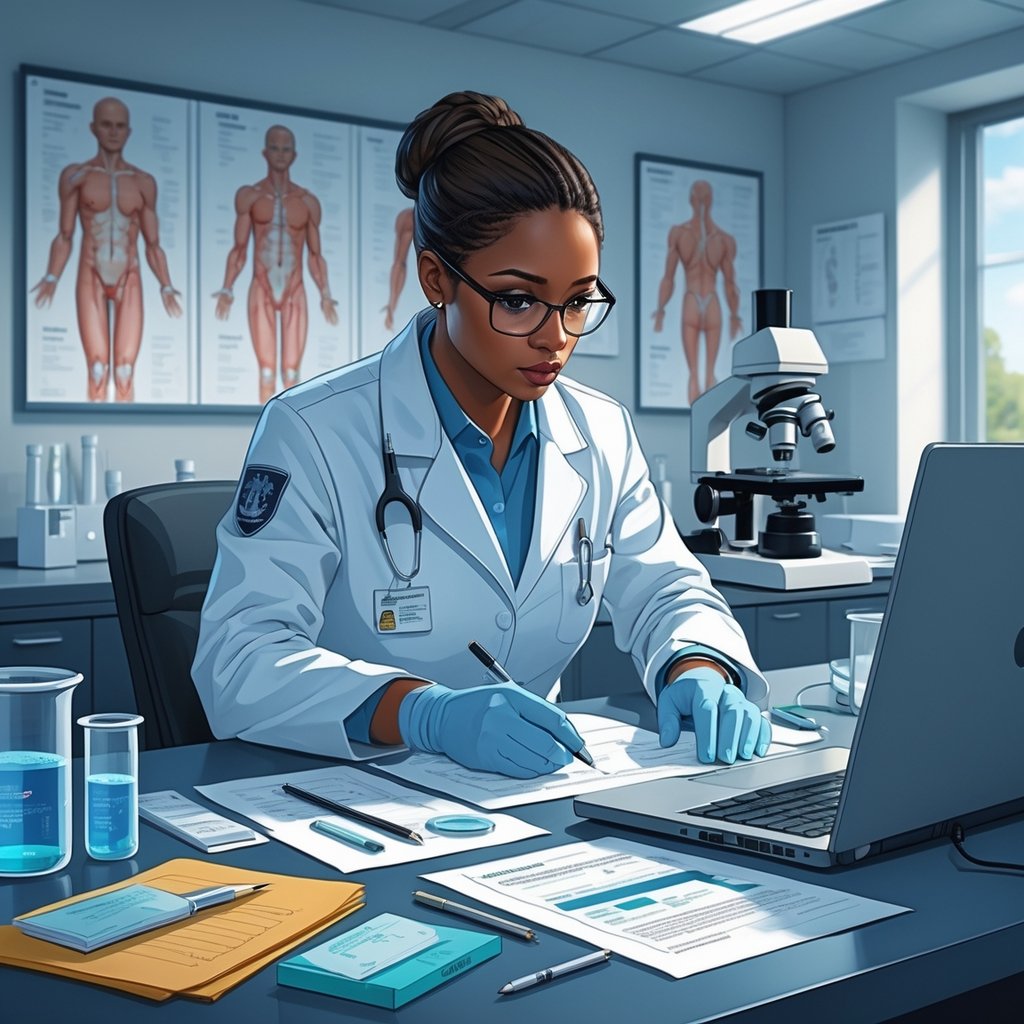
Medical legal officers follow specific procedures when investigating deaths that may involve criminal activity or legal issues. These procedures include performing detailed autopsies to find the cause of death, collecting and protecting evidence, and analyzing medical findings for court cases.
Medico-Legal Autopsy and Cause of Death Determination
The medicolegal death investigation system conducts death investigations when deaths appear unnatural or unexplained. You will perform a complete external and internal examination of the body during the autopsy process.
External examination includes photographing injuries, measuring wounds, and documenting any signs of trauma. You record the location, size, and pattern of all injuries on standardized forms.
Internal examination means opening body cavities to examine organs. You look for internal bleeding, organ damage, and disease that could cause death.
Toxicology testing helps you find drugs, alcohol, or poisons in blood and tissue samples. These tests can take weeks but often reveal key information about the cause of death.
You must determine both the cause of death (what killed the person) and the manner of death (natural, accident, suicide, homicide, or undetermined). This decision affects legal proceedings and insurance claims.
Evidence Collection and Chain of Custody
Proper evidence collection protects the legal case from being dismissed in court. You must follow strict rules when gathering and storing evidence from the body and scene.
Physical evidence includes:
- Clothing with blood, tears, or foreign materials
- Fingernail clippings that may contain DNA
- Hair samples and fibers
- Bullets or weapon fragments
You photograph each piece of evidence before collection. Each item goes in a separate container with labels showing the date, time, location, and your signature.
Chain of custody documentation tracks who handled evidence from collection to court. You record every person who touches the evidence and when transfers happen.
Evidence storage requires secure, climate-controlled facilities. Different types of evidence need specific storage conditions to prevent damage or contamination.
Analysis and Interpretation of Medical Findings
You analyze autopsy findings alongside police reports, witness statements, and scene photographs to form complete conclusions about the death.
Trauma analysis involves studying wound patterns to determine what weapons caused injuries. You can often tell if injuries happened before or after death based on bleeding patterns and tissue response.
Medical history review helps you understand if existing health problems contributed to the death. Heart disease, diabetes, or mental illness may affect your final determination.
Expert testimony requires you to explain complex medical findings in simple terms for judges and juries. You must present facts objectively without taking sides.
Report writing documents all findings, test results, and conclusions in detailed reports. These reports become permanent legal records that other medical examiners and attorneys can review years later.
Expert Testimony and Legal Proceedings
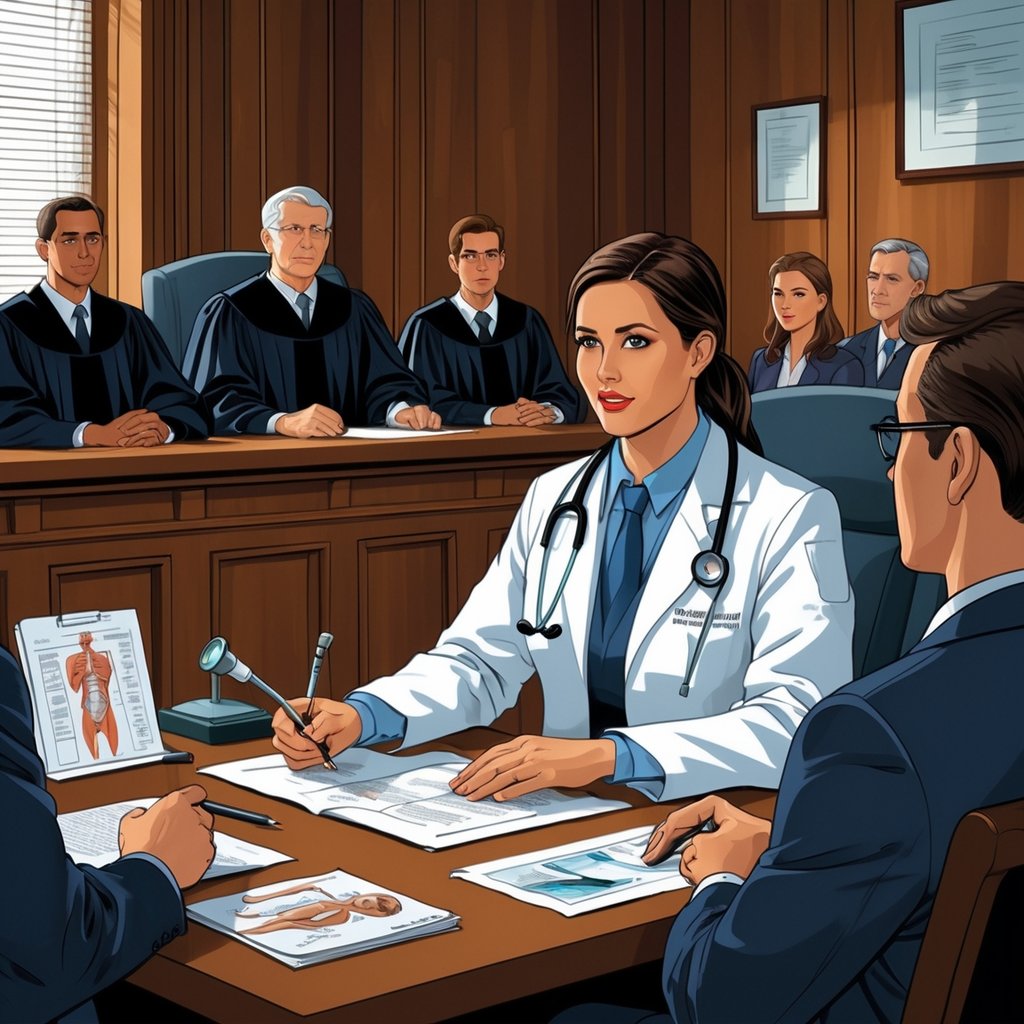
Medical legal officers bring their clinical expertise into courtrooms to help judges and juries understand complex medical evidence. They prepare detailed reports and work closely with attorneys to explain medical facts clearly.
Role as an Expert Witness in Court
As a medical legal officer, you serve as an expert witness when legal cases involve medical issues. Your job is to explain complex medical information in simple terms that judges and juries can understand.
Medical expert witnesses examine case facts and provide testimony to clarify medical issues for the court. You review medical records, analyze treatment decisions, and give your professional opinion about what happened.
Your testimony must be based on solid medical knowledge and scientific evidence. You can’t just guess or toss out personal opinions.
Key responsibilities include:
- Reviewing all medical records in the case
- Explaining medical terms and procedures
- Giving opinions about standard care practices
- Answering questions from lawyers and judges
Medical professionals have a duty to provide scientifically sound and unbiased testimony in both civil and criminal cases. You must stay neutral and stick to the medical facts.
Preparation of Medico-Legal Reports
Your written reports form the foundation of your expert testimony. These documents must be clear, accurate, and easy to understand for people without medical training.
Each report should include your medical background and why you are qualified to give opinions on the case. You need to list all the documents you reviewed and explain your analysis step by step.
Essential report sections:
- Your medical credentials and experience
- Summary of medical records reviewed
- Timeline of relevant medical events
- Your medical opinions and reasoning
- Any visual aids or diagrams needed
You must write in plain language while keeping all medical details accurate. Avoid medical jargon that confuses non-medical readers.
Your reports often become evidence in court proceedings. They need to be thorough enough to stand up to questioning from opposing lawyers.
Communication with Legal Professionals
Working with attorneys means you have to communicate clearly about tricky medical topics. You need to break down medical concepts so lawyers can use them in their cases.
Effective collaboration with medical expert witnesses involves careful preparation and ongoing communication. Lawyers count on you to guide their questions and help them grasp medical evidence.
Expect to meet with legal teams more than once before any court date. These sessions help you figure out what lawyers want and get you ready for cross-examination.
Communication priorities:
- Explain medical terms in plain language
- Point out strengths and weaknesses in the medical evidence
- Help lawyers know which questions to ask
- Prepare for tough questions from the other side
Doctors who step into medical legal roles need to shift how they talk. Legal language demands precision and clarity, especially under pressure.
Sometimes you’ll need to talk with other medical experts on the case. This keeps medical opinions consistent and backed by solid evidence.
Challenges, Ethics, and Skills Required
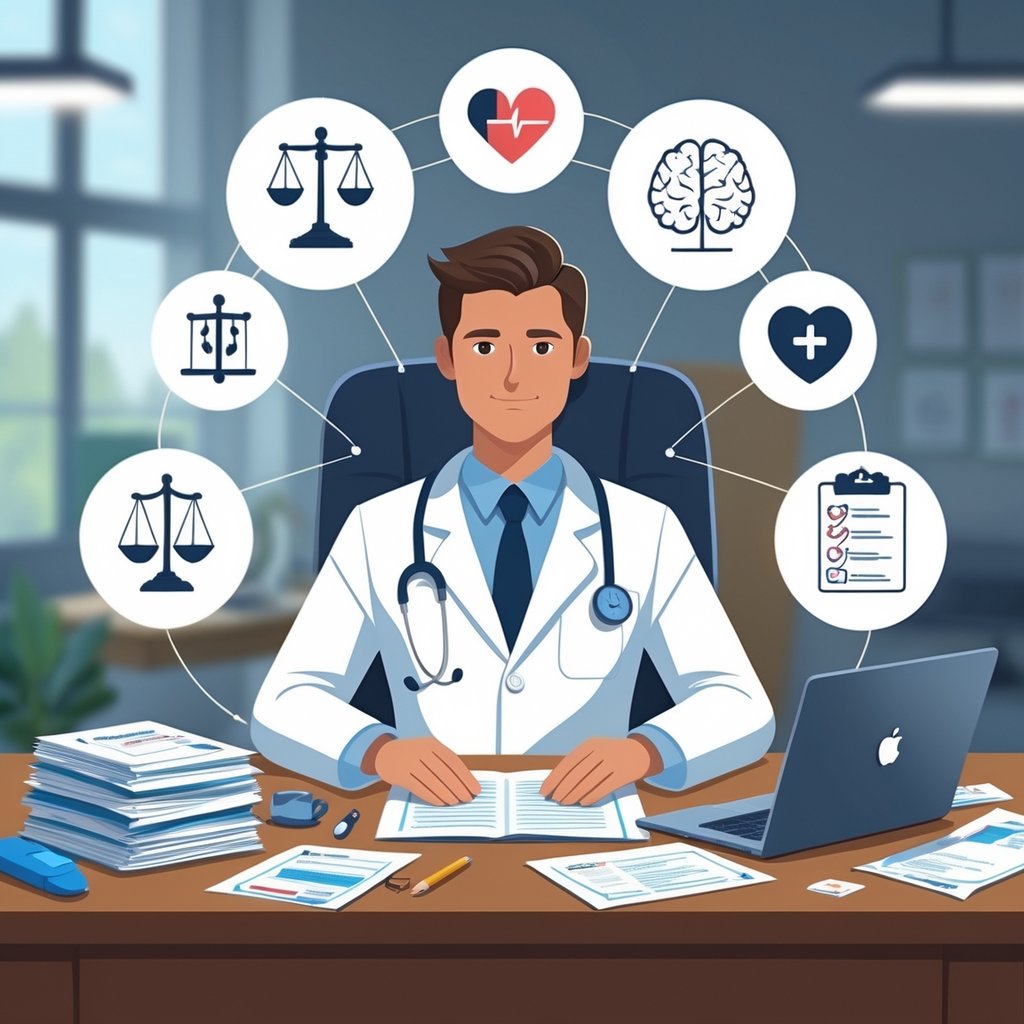
Medical legal officers deal with tough ethical challenges. Handling sensitive cases takes both deep medical knowledge and a real understanding of the law.
Integrity really matters here. You need to translate medical ideas for legal audiences and manage some emotionally draining situations.
Ethical Responsibilities and Integrity
You’ve got to stick to the highest ethical standards in this role. Balancing medical confidentiality with what the law demands isn’t always easy.
Professional integrity is your foundation. Don’t let personal opinions color your medical assessments or legal recommendations.
Medicolegal ethics guidelines offer extra direction for this unique space between medicine and law.
Stay objective when reviewing malpractice cases. Focus only on the facts and what’s accepted as standard care.
Key ethical duties include:
- Keeping patient information confidential within legal boundaries
- Giving honest, unbiased medical opinions
- Steering clear of conflicts of interest
- Following both medical and legal professional rules
Dealing with Sensitive and Complex Cases
You’ll run into emotionally tough cases. These might involve serious injuries, deaths, or medical negligence claims.
Medical malpractice cases need careful review of treatment decisions and outcomes. Go through medical records closely and compare actions to accepted standards.
Current challenges facing medico-legal experts include more complicated cases and new medical technology. You’ll need to keep up with medical advances and the latest legal requirements.
Sometimes families or lawyers might push for certain conclusions. Stand your ground and stick to what the evidence says.
Common challenging case types:
- Birth injury claims
- Surgical complications
- Medication errors
- Delayed diagnosis cases
- End-of-life care disputes
Essential Medical and Legal Skills
You need solid medical knowledge in your specialty to do this work well. Medicolegal work requires you to explain tough medical terms in ways legal folks can follow.
Strong written communication matters. You’ll write reports that judges and juries have to understand.
Critical technical skills:
- Analyzing medical records
- Delivering expert testimony
- Preparing legal documents
- Researching and investigating cases
Translate medical ideas into everyday language. Most legal professionals and court staff don’t have a medical background.
Time management is key, especially when you’re juggling multiple cases. Court deadlines are strict and don’t wait for anyone.
Professional development areas:
- Continuing medical education
- Training in legal procedures
- Communication workshops
- Ethics certification programs
Career Pathways and Future Outlook

Medical legal officers need training that blends medicine and law. Doctors can get into this field through a few different routes, and there are more opportunities now with new tech and changing healthcare laws.
Qualifications and Training to Become a Medical Legal Officer
You’ll need both medical and legal education for this job. Most roles call for a medical degree plus extra training in legal procedures.
A medical degree is your starting point. You have to finish medical school and know clinical practices, patient care, and medical terms.
Legal training can come from:
- Law degree (JD or LLB)
- Certificate programs in medical law
- Courses in forensic medicine
- Training in legal procedures and court testimony
Many employers look for board certification in forensic pathology or similar specialties. You also need to explain complex medical stuff clearly to lawyers.
Key requirements include:
- Medical license in your state
- Knowledge of legal procedures
- Experience with medical records and documentation
- Understanding of medical ethics and standards
Opportunities for Doctors in Medico-Legal Fields
Doctors can move into medical legal careers in a few ways. Medico-legal advisors handle all kinds of cases, from general advice to claims and regulatory problems.
Hospitals and healthcare systems hire medical legal officers for:
- Malpractice claims
- Regulatory compliance
- Risk management
- Policy development
Government agencies offer jobs in:
- Public health departments
- Medical examiner offices
- Regulatory bodies
- Insurance companies
Private practice options include:
- Expert witness work
- Medical consulting
- Independent medical examinations
- Forensic investigations
You might want to start with legal consulting while still practicing medicine. That way, you can see if this field fits you before making a full switch.
Emerging Trends and Advancements
The medical legal field keeps growing as healthcare gets more complicated. New at-home tests and medical wearables mean health lawyers are more in demand.
Technology brings new challenges:
- Telemedicine regulations
- Digital health record privacy
- AI in diagnosis
- Remote patient monitoring
Regulatory changes fuel job growth too:
- Updated HIPAA requirements
- New drug approval rules
- Medical device regulations
- Healthcare fraud prevention
Salary expectations are strong. Some medical law careers pay up to $180,000 or more.
As medicine gets more technical, your expertise becomes even more valuable in legal cases involving complex treatments or diagnostics.
Frequently Asked Questions
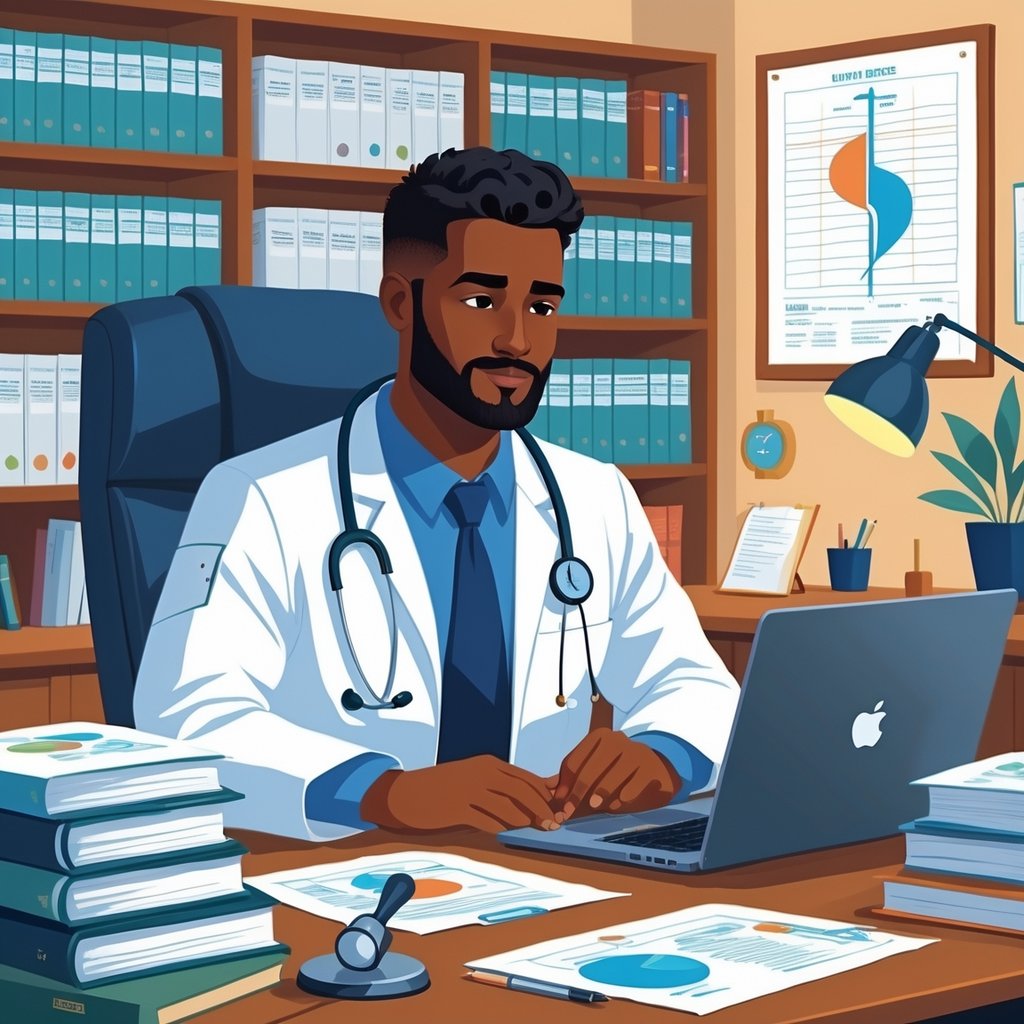
People have lots of questions about what medical legal officers do, what training they need, and how to get started in this career. You need solid medical and legal backgrounds to handle healthcare regulations and malpractice claims.
What are the primary responsibilities of a medical legal officer?
Medical legal advisors use their medical expertise and legal knowledge to guide on healthcare regulations, malpractice claims, and patient rights. You’ll review medical records and dig into cases where medicine and law overlap.
Daily work might include looking at autopsy reports and medical evidence. You’ll give expert opinions on whether care met accepted standards.
You might also testify in court. Your testimony helps judges and juries make sense of tricky medical details in legal cases.
What educational qualifications are required to pursue a career as a medical legal officer?
You’ll need both medical and legal education. Most jobs require a medical degree from an accredited school.
You’ll also need legal training or certification in medical legal issues. Some employers prefer if you have a law degree along with your medical degree.
Many medical legal officers go through specialized training programs. These focus on forensic medicine and legal procedures.
Are medical legal officers required to have courtroom experience?
You don’t need courtroom experience to start. Most employers will train you in legal procedures and how to testify.
As you move up in your career, courtroom experience becomes more important. You’ll probably end up testifying as an expert witness at some point.
Training programs often include practice trials. These help you get comfortable presenting evidence in court.
What is the typical salary range for a medical legal officer?
Salaries depend on where you work, your experience, and the type of employer. Entry-level roles usually start between $80,000 and $120,000 a year.
Experienced medical legal officers can make $150,000 to $300,000. Those in private consulting often pull in higher fees than folks working for the government.
Your specialty affects pay too. If you handle complex malpractice cases, you’ll probably earn more.
What differentiates a medical legal officer from other types of legal professionals within the healthcare industry?
You bring together medical training and legal know-how. Most healthcare legal professionals only have law degrees, not medical backgrounds.
Your medical experience helps you understand clinical procedures and medical terms. You can spot possible errors or standard care issues.
Medical lawyers focus mainly on the legal side of healthcare. You add the medical perspective that lawyers need to build strong cases.
How long does it typically take to establish a career as a medical legal officer?
You’re looking at about 8 to 12 years of education and training after high school. That’s 4 years for undergrad, then another 4 in medical school.
After that, medical legal officers usually put in 2 to 4 years of specialized training or residency. Some folks go for fellowship programs that dive into forensic medicine.
Gaining real expertise takes another 3 to 5 years of hands-on experience. During this phase, you pick up skills in case analysis, writing reports, and giving expert testimony.






